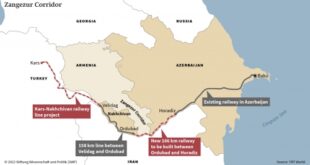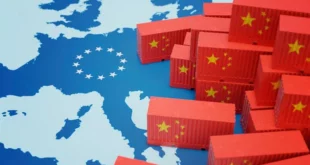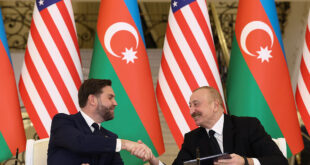 When Vladimir Putin was elected president in 2000, Russian television was a rough-and-tumble place, broadcasting fierce debates and biting satire. One by one, those programs were taken off the air.Sunday’s presidential election marks a symbolic end to Russia’s tortured post-Soviet odyssey from poverty and despair to economic might. But along the way, the country has embraced a rigid political orthodoxy — call it “Putinism” — that the Kremlin has used to crush the independence of political parties, civil society and the media.
When Vladimir Putin was elected president in 2000, Russian television was a rough-and-tumble place, broadcasting fierce debates and biting satire. One by one, those programs were taken off the air.Sunday’s presidential election marks a symbolic end to Russia’s tortured post-Soviet odyssey from poverty and despair to economic might. But along the way, the country has embraced a rigid political orthodoxy — call it “Putinism” — that the Kremlin has used to crush the independence of political parties, civil society and the media.
Â
“Everything today is being seen through the eyes of the Putin presidency,” said Savik Shuster, the former host of “Freedom of Speech,” one of the last of the no-holds-barred talk shows when it was yanked in 2004.
Â
Now, he said, Russia’s TV fare suggests “that everything that is democratic is actually stale and bitter and useless.”
Â
The president’s stature is such that the election is expected to be little more than a ratification of his choice of a successor: his longtime friend and first deputy prime minister, Dmitry Medvedev. Putin, meanwhile, plans to become prime minister when his presidential term ends in May — and many suspect he will continue to run Russia from behind the scenes.
Â
Voters seem reluctant to see the Putin era end.
Â
“Before Putin, Russia was a mess, I was offended by seeing how Russia was humiliated by the West,” said Ella Luschenko, 45, who moved to Moscow with her two sons in the late 1990s after divorcing an alcoholic husband.
Â
“Now, you don’t have to go to bed thinking, ‘What am I going to do tomorrow to feed myself?”‘
Â
What about democracy?
Â
“Russia never knew democracy, and attempts to introduce it always ended in a bad way,” she said.
Â
Indeed, that view is shared by millions of Russians who equate democracy with the chaos, corruption and economic meltdown of the years under Putin’s predecessor, Boris Yeltsin.
Â
Yeltsin was, in a sense, a demolition expert who brought the remnants of the Soviet Union crashing down around the heads of the Russian people. What followed were wars, financial shocks and beggary. The low point came in 1998, when the ruble collapsed and Russia was forced to accept a humiliating bailout from the International Monetary Fund.
Â
After Putin was elected in March 2000, it was his job — essentially — to build a replacement for the socialist utopia.
Â
His experience as a spy and his career as a bureaucrat in the 1990s in St. Petersburg and Moscow may not have made him the ideal national architect. But eight years ago he was the only one Russia had.
Â
Today, Russians seem to have many reasons to be content with the status quo.
Â
Fueled by a boom in the price of oil, gross domestic product has grown by 70 percent from 2000 to 2007, real incomes have doubled, and the poverty rate has been cut almost in half. Russia today has more billionaires than any nation except the United States and Germany. Perhaps one-fifth of Russians belong to a fledgling middle class.
Â
Medvedev has pledged to strengthen Russian democracy. But democratic reform may come slowly to Russia, if it comes at all.
Â
While he is barred by the constitution from seeking a third term as president, Putin — whose approval ratings in February hit 85 percent — is likely to be regarded as Russia’s national leader for months to come.
Â
President Bush suggested Thursday that one clue about who’s in charge will be which of the two — Putin or Medvedev — shows up at the next Group of Eight gathering of world leaders in July. Asked at a news conference if Medvedev would be Putin’s puppet, Bush said he would not reach that conclusion.
Â
As president, Medvedev could one day eclipse Putin. And he may be genuinely seek to reduce the role of the state in the lives of Russians.
Â
But Lev Ponomarev, a Russian human rights activist, argued that it would be illogical for Putin to have labored for eight years as president only to hand-pick a successor who would reverse his policies. “In my opinion, Medvedev tomorrow is just Putin today,” he said.
Â
In part, the appeal of Putinism may be rooted in Russia’s history of autocratic and authoritarian leaders. In part, it may reflect the trauma of the early years of the post-Soviet era.
Â
Along with many of his countrymen, Putin watched in anguish as the Soviet empire broke up and its constituent states declared independence. He later called the Soviet collapse “the greatest geopolitical catastrophe of the 20th century.”
Â
His first project — begun even before becoming president — was to halt this process, by ending the insurgency in the North Caucasus region of Chechnya.
Â
He launched a war that left the capital of Grozny in ruins. Today, major fighting in Chechnya is largely over: but the victory came at a cost, critics say, of widespread human rights abuses and thousands of deaths.
Â
Putin had watched the Soviet Union stagger to collapse under the weight of its command economy. Initially at least, he had ambitious plans for developing Russia’s markets.
Â
He pushed through landmark reforms to the tax system and land codes, helping to lay the groundwork for transferring property — almost all of it in government hands — to private control.
Â
But his drive for economic modernization stalled in the midst of his battles with the so-called “oligarchs,” financiers who made billions in questionable privatization deals under Yeltsin in the 1990s. Putin made a pact: the oligarchs could keep their money if they didn’t challenge him politically.
Â
Those who refused were imprisoned — like the former Yukos Oil chief Mikhail Khodorkovsky in 2003 — or fled, like the business magnate Boris Berezovsky. Assets of these pariah businessmen, meanwhile, were acquired by state corporations or cooperative tycoons, often at bargain prices.
Â
But Putin’s most important legacy may be the extinction of political pluralism.
Â
Under electoral laws adopted in 2006, more than half of political parties were disbanded and liberal democratic opposition figures lost their seats in parliament. Political movements that challenge the Kremlin have been harassed, their activists arrested, their rallies dispersed by club-wielding riot police.
Â
As he engineered the retreat from European-style democracy, Putin looked to resuscitate symbols from the country’s autocratic past. At Kremlin ceremonies, guards in uniforms reminiscent of the czarist court stand at attention. Dignitaries are greeted by the strains of the Soviet anthem, the original lyrics of which praised the dictator Josef Stalin.
Â
Now Russia faces the ultimate test of a democracy, nationwide elections. All of the nominally independent institutions needed to keep the elections honest — the courts, the legislature, the media, civic groups, political parties and regional governments — are to one degree or another under the sway of the Kremlin.
Â
Shuster, meanwhile, now hosts television talk shows in Ukraine. When his Russian show was canceled in 2004, he wondered initially whether authorities had a personal grudge against him, but then concluded otherwise: “It was basically the system.”
Â
Putin’s Kremlin, he said, “could not permit open discussions.”
Â
Major events in President Vladimir Putin’s rise to power:
Â
— Aug. 9, 1999: President Boris Yeltsin appoints Putin, a former Federal Security Service chief and KGB veteran, as acting prime minister. Putin vows to take firm action to restore order to Russia’s restive southern republics.
Â
— September 1999: Nearly 300 people are killed in a series of apartment bombings in Moscow and other cities, attacks authorities blame on Chechen separatists. Later that month, Putin orders the bombing of the Chechen capital, Grozny, leading to the start of the second Chechen war.
Â
— Dec. 31, 1999: Yeltsin announces his resignation; Putin becomes acting president.
Â
— March 26, 2000: Putin scores a convincing victory in Russia’s first democratic transfer of power after promising to end years of political chaos and restore Russia as a global power.
Â
— Aug. 12, 2000: An explosion sinks the Kursk, one of Russia’s most advanced submarines, killing 118 sailors. Putin remains at the Black Sea resort of Sochi throughout the crisis and only agrees to meet with the submariners’ relatives after an onslaught of media criticism.
Â
— April 14, 2001: The Kremlin-connected gas giant OAO Gazprom seizes control of the only independent nationwide television network, evicting resistant journalists and installing a new, pliant team during a nighttime takeover.
Â
— June 16, 2001: President Bush and Putin meet for the first time. Bush later tells reporters he looked into Putin’s eyes and “was able to get a sense of his soul.”
Â
— Oct. 23, 2002: Armed Chechen rebels storm a crowded Moscow theater during a musical, taking hundreds hostage. The three-day standoff ends when special troops storm the theater, freeing hundreds of hostages while killing the rebel leader and dozens of gunmen. More than 100 hostages die from the effects of knockout gas.
Â
— Oct. 25, 2003: Authorities arrest the country’s richest man, Mikhail Khodorkovsky, and charge him with tax evasion and fraud. Many observers say the actions against the owner of oil giant Yukos are a Kremlin-directed campaign to keep him out of politics.
Â
— March 14, 2004: Putin easily wins a second four-year term, capturing more than 70 percent of the vote to defeat five challengers. Western observers criticize the election, saying slanted coverage in state-run media made for a one-sided campaign.
Â
— Sept. 3, 2004: A three-day hostage siege at a school in the troubled North Caucasus ends in chaos and bloodshed, leaving more than 330 people dead, most of them children. Several days later, a shaken Putin appears on television and calls on the Russian people to mobilize against terrorism.
Â
— Dec. 12, 2004: Putin signs a bill scrapping gubernatorial elections, a move that gives him the right to appoint governors and dissolve regional legislatures if they refuse to confirm his nominees.
Â
— Jan. 1, 2006: Gazprom halts gas supplies to Ukraine after Kiev refuses its last offer on the terms of natural gas deliveries and transit. Europe’s energy supplies are affected. The showdown underlines tension that emerged after Viktor Yushchenko beat his Russian-backed rival in the bitter presidential electoral battle in 2005.
Â
— May 10, 2006: In his state of the nation speech, Putin rebuffs U.S. criticism of Russia’s democracy and treatment of its neighbors, likening the United States to a wolf. “Comrade wolf knows whom to eat, he eats without listening, and he’s clearly not going to listen to anyone.”
Â
— July 15, 2006: Russia hosts its first Group of Eight summit in Putin’s hometown, St. Petersburg, as bilateral relations between Moscow and Washington worsen. U.S. and Russian negotiators fail to reach agreement over Russia’s bid to join the World Trade Organization.
Â
— Oct. 7, 2006: Investigative journalist Anna Politkovskaya, a sharp critic of Putin and the conduct of war in Chechnya, is shot to death at her Moscow apartment building in an apparent contract killing. Putin denounces the murder as a “disgustingly cruel” crime, but also plays down her influence as “very minor.”
Â
— Nov. 23, 2006: Former KGB agent Alexander Litvinenko dies of radiation poisoning in a London hospital. As he lay dying, the Kremlin critic said Putin was being behind his poisoning, describing him as “barbaric and ruthless.”
Â
— Dec. 10, 2007: Putin endorses the soft-spoken First Deputy Prime Minister Dmitry Medvedev in the March 2 presidential contest. A day later, Medvedev urges Putin to accept the post of prime minister after the election. Putin later accepts.
Â
Facts on Russia’s presidential election Sunday to choose Putin successor
Â
VOTING:
Â
More than 109 million Russians are eligible to vote in Sunday’s presidential election. The first of more than 96,000 polling stations across the country’s 11 time zones will open at 3 p.m. EST Saturday, and the last will close at 1 p.m. EST Sunday. Early results are expected shortly after polls close; a complete official count may not be available until Monday. Turnout in the last presidential election, in 2004, was 64 percent.
Â
WHO’S RUNNING
Â
Voters face a slate of four candidates, but First Deputy Prime Minister Dmitry Medvedev — who has been endorsed by the outgoing President Vladimir Putin — is expected to win an overwhelming victory; some predictions say he could get up to 70 percent of the vote. Communist Gennady Zyuganov, ultranationalist Vladimir Zhirinovsky and little-known politician Andrei Bogdanov also are running, but most see them as Kremlin-designed window-dresssing to give the vote the appearance of competition and fairness.
Â
WHAT’S AT STAKE
Â
Putin, who is overwhelmingly popular after two consecutive terms in office, has indicated he will accept Medvedev’s proposal to become prime minister after the election. That has raised questions about where the true center of power will be — in Medvedev’s presidency or Putin’s premiership. Medvedev has openly espoused support for Putin’s domestic and foreign policies, although many of his recent speeches have given the impression of someone less harsh and more liberal-minded than Putin. In addition to dealing with an emboldened armed forces and increasingly aggressive security agencies, the new president faces the task of continuing reforms to the creaky, Soviet-era systems of education, health care and agriculture, among other things.
Source: Associated Press
Kavkaz Center
 Eurasia Press & News
Eurasia Press & News



